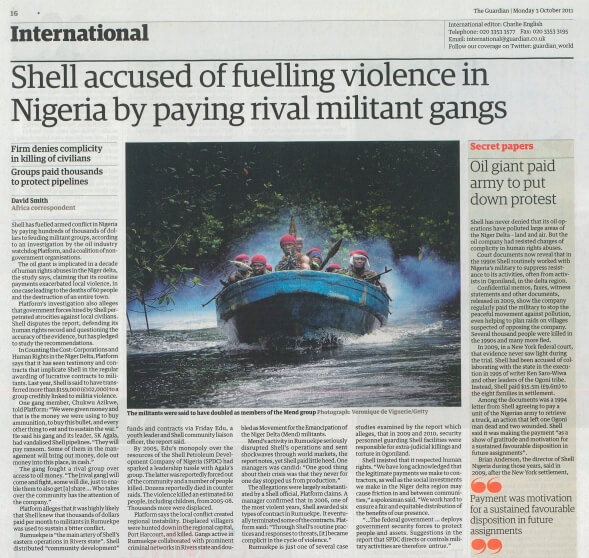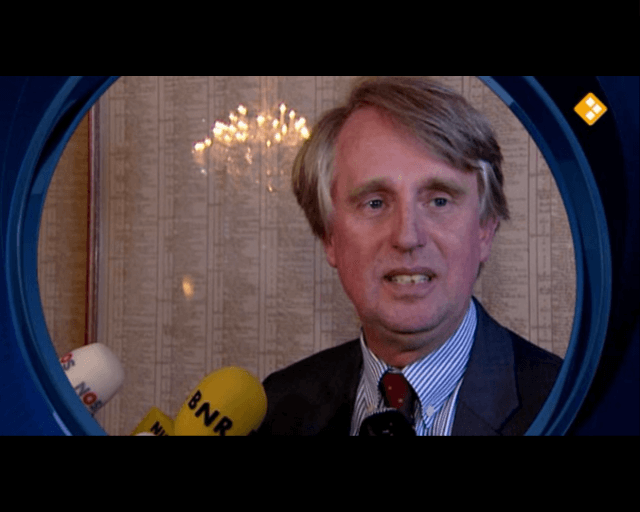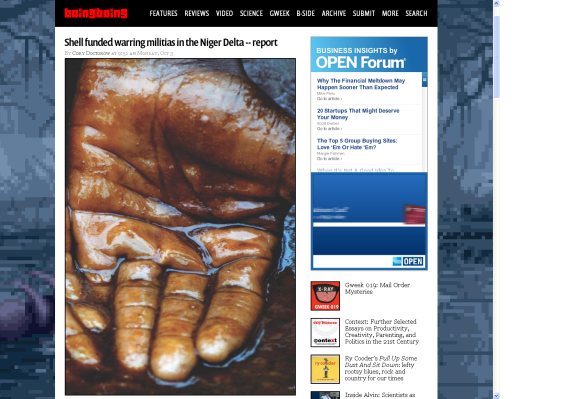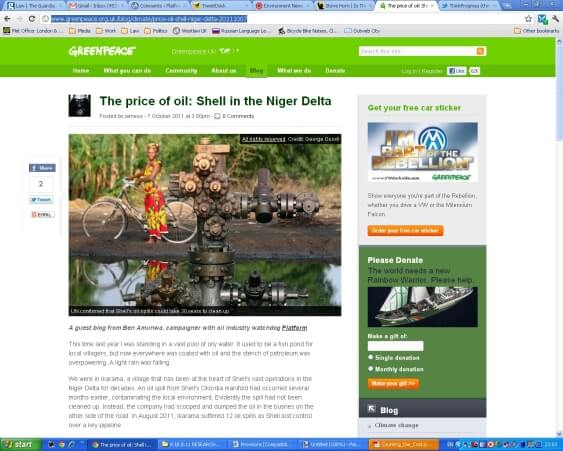 Shell’s human rights abuses in Nigeria have come under renewed international scrutiny over the past week as Platform’s new report, Counting the Cost, revealed that the oil giant fuelled recent human rights abuses and government crackdowns in the Niger Delta.
Shell’s human rights abuses in Nigeria have come under renewed international scrutiny over the past week as Platform’s new report, Counting the Cost, revealed that the oil giant fuelled recent human rights abuses and government crackdowns in the Niger Delta.
The UN Dispatch described Platform’s report as a “bombshell“, and praised the global coalition of NGOs backing the report:
If there’s one piece of good news from the half-century of oil-fueled violence in Nigeria’s Niger Delta, it might be that it has spawned some of the best, brightest, and most passionate human rights work in the region.
London based Advocates for Human Dignity also issued a statement of support:
[We] strongly condemn these tactics by Royal Dutch Shell and further demands that the Nigerian government take steps to prevent these types of atrocities from happening in the future. … We would also like to applaud Platform for developing this report in the name of human rights.
Media spotlight:
Counting the Cost has achieved amazing media coverage in The Guardian, Reuters, BBC World Service Business and Africa, and UPI. The story was splashed on the front pages of Nigeria’s daily newspapers, (with articles in the Tribune, My Joy, The Nation and This Day). Media outlets in the Netherlands, Greece, France, Italy, Australia, Canada, Ghana and Bangladesh also covered the story.
On Wednesday 5 October, the CEO of Shell Netherlands, Dick Benschop, was challenged on live TV. The interviewer raised Platform’s report and questioned Dick (in Dutch) on Shell’s abuses in Nigeria for about 8 minutes.
You can listen to radio interviews with Platform on the BBC, US radio station FSRN and the national radio channel in Canada here. Getting BBC Business Daily to run the story was an achievement in itself and involved multiple interviews with senior editors.
As exciting as mainstream press has been the chain reaction in the twitter and blogo-spheres. The celebrated, super-cool blog, Boing Boing (see above) posted the story and tweeted it several times to over 100,000 followers. Platform’s Ben Amunwa also made a guest post on the Greenpeace UK blog.
By midnight on Monday 3 October, over 1,000 people had shared the The Guardian story on facebook, in addition to those who read the full page spread in yesterday’s paper. As of writing, 648 of you shared one of Platform’s blog post on facebook.
From Monday morning till Sunday night, Twitter lit up with mentions and RTs about Shell’s fuelling violence and killings in Nigeria. Here’s a brief run down of what you tweeted.
Andrew Simms (nef) said: “The relentless researchers at Platform London reveal how Shell oil company funded violent militants in the Niger Delta”
George Smeeton (WWF) said: “Thanks – pretty shocking findings in this report. No price too high for oil companies, it seems”
Zoe Flood (journalist) said: “Impressive investigative report from @PlatformLondon on Shell’s funding of militants in #Nigeria #NigerDelta”
Special thanks go to our good friends on twitter @rattlecans, @peopleandplanet, @FairPensions, @AndrewSimms_nef, @benwest, @laurirose, @wdmuk and many more.
Political pressure
On Wednesday 5 October, the House of Representatives, part of Nigeria’s legislative body ordered an official investigation into the allegations that Shell fuelled violence in the Niger Delta by paying armed militant gangs.
Local human rights activist Morris Alagoa of Friends of the Earth Nigeria/ERA said:
Dear Ben … I was watching TV when the motion was raised on the floor of the House of Reps. And truly speaking, I was excited.
Women’s rights advocate Emem J Okon of Kebetkache Women’s Development & Resources Centre added:
I hope the House Committee responsible for this investigation will do a thorough job. I also hope they will reach out to community members for information.
As the investigation continues, all we can say is a huge THANK YOU for supporting human rights and accountability in the Niger Delta. Your voice is vital to the ongoing campaign to end Shell’s human rights abuses.


